Blog
Whiteclay Liquor Stores Shut For Good
- Details
- Created: Monday, November 06 2017 22:10
 In a Victory for Pine Ridge, Oglala Lakota Have Chance to Reclaim the Town that Caused Much Pain
In a Victory for Pine Ridge, Oglala Lakota Have Chance to Reclaim the Town that Caused Much Pain
Sometimes sunlight shines through the smallest opening. Such was the case on September 30th, when an error in legal paperwork shut down four liquor stores in Whiteclay, Nebraska for good. The stores bootlegged 11,000 cans of beer per day, mostly to residents of the Pine Ridge Oglala Lakota Sioux reservation just over the border in South Dakota, perpetuating cycles of physical and social harm to the residents there. The Nebraska Supreme Court Decision ends the store owners’ appeals, allowing the reservation to start healing and the town to recast itself from a source of pain to a site of hope.
“[The] Nebraska Supreme Court decision means that the shame of Whiteclay is over,” said Dave Domina, the who fought to keep the shut-down order in place, to the Omaha World-Herald.
“When Alcohol Justice joined this fight five years ago, there were already Oglala Lakota activists engaged in direct non-violent actions who’d been at it for decades.” said Jorge Castillo, advocacy director at Alcohol Justice. “All of us knew that if we were persistent, we would see the stores shut.”
The stores first closed in early May as the result of a Nebraska Liquor Control Commission decision. That decision refused to automatically renew the stores’ licenses on the grounds that law enforcement in the area was insufficient to deal with the crime, sex trafficking, injury, and poverty in the area. The assumption was that the stores would have to re-apply, and would be denied in the face of the ongoing public health disaster in the town.
The decision did not sit happily with a few Nebraskans. Loren Paul, a Sheridan County Commissioner who had advocated for keeping the stores open, told the Guardian, “It’s market forces … [Whiteclay] is there because there’s a need and somebody is going to supply that need.” Unsurprisingly, the store owners launched a court challenge at the district court, arguing that the liquor stores did not have the authority to order the re-application.
“The arguments made by the liquor stores were unbelievable,” Castillo said. “How can you argue that a liquor commission only exists to rubber-stamp alcohol outlets? A liquor commission’s job is to make sure that alcohol is sold in a way that is both legal and it doesn’t hurt the community."
Nebraska Attorney General Doug Peterson concurred, and appealed the decision to the Nebraska Supreme Court. Yet instead of ruling on the validity of the liquor commission's ruling denying the renewal of the licenses, the court found fault with the legal process of the beer store owners. Citing the owners’ legal team’s failure to notify citizen protestors of the appeal, the Supreme Court threw out their entire case--leaving the Liquor Control Commission’s ruling in place.
In an October 2 editorial, the Lincoln Journal Star editorial board hailed this “rare victory to the tribes residing on the Pine Ridge Reservation.” However, they caution, the economic and social forces that enabled the liquor stores to gain their foothold are still in place. The decision, they chastise, “by no means absolves [Nebraska] of responsibility in the community and family problems caused by Whiteclay.”
Indeed, Whiteclay faces a number of challenges as it climbs free from the torrent of alcohol sales. As the Guardian notes, the area is still wracked by unsolved murders. Neighboring Pine Ridge experiences an ongoing plague of suicides and fetal alcohol spectrum disorders. Meanwhile, federal grants and assistance have been drying up.
“I’ve lost cousins and other relatives on the streets of Whiteclay,” Seymour Young Dog, a retired engineer living in Pine Ridge, told the World-Herald. “We’ve got to make this a better place.”
Nebraska State Senators Patty Pansing Brooks and Tom Brewer, the most prominent critics of the Whiteclay beer stores in the State Legislature, co-hosted a summit on Saturday, September 30, in Whiteclay to look for new directions for the town. A Family Dollar is slated to open and the Oglala Lakota are building out social services and counseling resources, suggesting new directions for the town and the Pine Ridge residents.
"From the beginning we held to a simple premise, namely that anything that can be legally opened can be legally closed," Castillo said. "The end of the illegal activities associated with the Whiteclay liquor stores will now change the trajectory of the Oglala people for the rest of time. The people of Pine Ridge have a new future ahead of them."
UPDATE: Whiteclay Redevelopment has launched a crowdfunding campaign for Whiteclay Makerspace, a facility for Lakota artisans to practice their crafts and revitalize their community.
READ MORE about the history of the fight to close the Whiteclay stores.
Big Alcohol Lunges to Take Over Cannabis
- Details
- Created: Friday, November 03 2017 19:21
 Public health advocates face a complicated question: how can marijuana’s growing acceptance as a recreational and medical product be reconciled with the potential for a powerful pot industry to engage in the kinds of reckless, corrupt, and manipulative practices Big Alcohol has mastered? Constellation Brands, the owner of Corona beer and Svedka vodka among other brands, offers an easy answer: with their purchase of a 10% stake in Canopy Growth, they declare Big Alcohol’s intention to be the marijuana industry.
Public health advocates face a complicated question: how can marijuana’s growing acceptance as a recreational and medical product be reconciled with the potential for a powerful pot industry to engage in the kinds of reckless, corrupt, and manipulative practices Big Alcohol has mastered? Constellation Brands, the owner of Corona beer and Svedka vodka among other brands, offers an easy answer: with their purchase of a 10% stake in Canopy Growth, they declare Big Alcohol’s intention to be the marijuana industry.
With Monday’s (10/30/17) $191 billion dollar investment in the Canadian marijuana producer Canopy, Constellation has declared its intention to get out in front of the legalization of recreational marijuana in Canada and the U.S. “Our company’s success is the result of our focus on identifying early-stage consumer trends, and this is another step in that direction,” Constellation CEO Rob Sands told Bloomberg Businessweek.
What that means seems still up for debate, even among the business partners themselves. Bruce Linton, the CEO of Canopy—which makes medicinal marijuana products for the Canadian market—reassured Bloomberg that “[t]here’s no need to include alcohol, nor is there an intent to include alcohol” in their products. Yet Constellation told Beer Business Daily (subscription required), “There are going to be alcoholic beverages that also contain cannabis.”
This presents multiple problems both for public health advocates and independent marijuana producers. The resources of Big Alcohol, compared to those of marijuana companies, are vast, including access to lobbyists and the ability to distort public health research. While Canopy currently works in a regulated medical marijuana space, once full legalization passes, Big Alcohol’s expertise in tearing down safety regulations, promoting junk science, and marketing to youth will introduce a raft of health problems that negate the benefits of prescription weed.
“The alcohol companies are somewhat terrified of this industry,” a rival marijuana executive told Bloomberg. “They see cannabis as a substitute for alcohol.” Data on chronic marijuana use are scant, so it remains unclear whether long-term marijuana use is better for the public health, but this buyout makes that issue moot: if Big Alcohol holds the marijuana industry’s reins, cannabis has zero chance of mitigating alcohol-related harms.
This buyout could signal the start of a race to the bottom among marijuana companies. MolsonCoors and Diageo both told Bloomberg in a separate article they are anticipating entering the marijuana industry, and their entry will instantly create Big Marijuana and gut independent growers that don’t enjoy such partnerships.
“Big Alcohol is what happens when you fail at regulating a recreational drug company,” said Michael Scippa, Public Relations Director of Alcohol Justice. “We can’t allow Big Marijuana to become something similar—and we really can’t let them be the exact same companies.”
READ MORE about how California’s marijuana regulators must not make the same mistakes we made with alcohol.
NYC Subway Bans Alcohol Ads
- Details
- Created: Friday, November 03 2017 18:34
 On Wednesday, October 25th, the board of the New York Metropolitan Transit Authority (MTA) agreed to remove all alcohol advertising from subway cars, buses, and stations. This historic ban, affecting the largest public transportation system in the country, follows similar actions by San Francisco, Los Angeles, Detroit, Baltimore, Seattle, and San Diego. The action was promoted by a grassroots coalition of community groups in the New York City area, working together as Building Alcohol Ad-Free Transit, and supported by councilmember Daniel Dromm of Jackson Heights, Queens.
On Wednesday, October 25th, the board of the New York Metropolitan Transit Authority (MTA) agreed to remove all alcohol advertising from subway cars, buses, and stations. This historic ban, affecting the largest public transportation system in the country, follows similar actions by San Francisco, Los Angeles, Detroit, Baltimore, Seattle, and San Diego. The action was promoted by a grassroots coalition of community groups in the New York City area, working together as Building Alcohol Ad-Free Transit, and supported by councilmember Daniel Dromm of Jackson Heights, Queens.
Alcohol industry representatives condemned the move, telling Ad Age it was “misguided and unsupported by the scientific research.” Yet multiple studies show that alcohol ad exposure, especially among underage drinkers, directly contributes to acceptance of booze. Even Big Alcohol’s voluntarily adopted—if often not strictly obeyed—advertising policies forbid ads in close proximity to schools and other places youth gather. Yet anyone who has spent any time in New York City understands, everyone gathers on subway platforms. The train is universal, and almost every child who goes anywhere by themself will use it daily.
The effort follows on the heels of landmark anti-alcohol-ad legislation in Los Angeles and the Bay Area. The Los Angeles efforts—which removed ads not just from transit but all publicly owned property—were spearheaded by the LA Drug and Alcohol Policy Alliance. Alcohol Justice led the Bay Area campaigns, which began with the removal of alcohol ads from BART, and expanded that to the San Francisco MTA and bus shelters.
Bruce Lee Livingston, Executive Director/CEO of Alcohol Justice, knows firsthand both the difficulty and impact of passing these bans. “Congratulations to everyone in New York City who worked hard to put this into place,” he said. “Less alcohol in a kid’s day—even just a picture of alcohol—helps them lead a healthier and happier life.”
READ MORE Alcohol Justice's report on alcohol ads on public transit.
READ MORE about the LA Drug and Alcohol Policy Alliance.
More Articles ...
Subcategories
Help us hold Big Alcohol accountable for the harm its products cause.
| GET ACTION ALERTS AND eNEWS |
STAY CONNECTED    |
CONTACT US 24 Belvedere St. San Rafael, CA 94901 415-456-5692 |
SUPPORT US Terms of Service & Privacy Policy |


